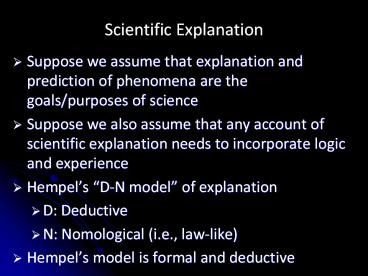Scientific Explanation - PowerPoint PPT Presentation
Title:
Scientific Explanation
Description:
My car radiator contains relatively pure water and the temperature last night ... Compare it to: 'All relatively pure water will freeze at 32 degrees [provided ... – PowerPoint PPT presentation
Number of Views:365
Avg rating:3.0/5.0
Title: Scientific Explanation
1
Scientific Explanation
- Suppose we assume that explanation and prediction
of phenomena are the goals/purposes of science - Suppose we also assume that any account of
scientific explanation needs to incorporate logic
and experience - Hempels D-N model of explanation
- D Deductive
- N Nomological (i.e., law-like)
- Hempels model is formal and deductive
2
Scientific Explanation
- E An event to be explained The water in my car
radiator froze last night. - How to explain this?
- (Relatively) pure water freezes at 32 degrees.
- My car radiator contains relatively pure water
and the temperature last night was below 32
degrees. - --------------------------------------------------
---------- - Therefore, E (the water in my car radiator
froze)
3
Scientific Explanation
- E An event to be explained The water in my car
radiator froze last night. - If some phenomenon, E, can be subsumed under
law-like generalizations and initial conditions
(i.e., derived validly from them), then that
phenomenon is explained. - Hempels model
- L1, L2 LN (Relatively pure water freezes)
- C1, C2 CN (My car radiator contains and the
temp is) - --------------------
- E
4
Scientific Prediction
- E An event predicted The water in my car
radiator will freeze last night. - Hempels model
- (Relatively) pure water freezes at 32 degrees (L)
- My car radiator contains relatively free water
and the temperature tonight will go below less
than 32 degrees (C1 and C2). - --------------------------------------------------
------------------ - So, the water is my car radiator will freeze
tonight (E).
5
Laws and causation
- The laws that function in the D-N Model of
explanation are universal statements these are
statements of the form whenever and wherever
conditions F occur, then so always and without
exception will certain conditions of another
kind, G, occur. - Strictly speaking, a statement will be considered
a law only if there are reasons to think it is
true. - But at least some laws (Galileos and Keplers)
would not qualify as they are known to hold only
approximately.
6
Laws and causation
- More recently some, like philosopher/physicist
Nancy Cartwright, have argued that all the
so-called laws of physics are tweaked so as to
make them fit exceptions. - Cartwright, How the Laws of Physics Lie.
7
Laws and causation
- The account of laws (they are statements of the
form whenever and wherever conditions F occur,
then) needs more however to rule out
accidental generalization - For example, the true and universal statement
All the rocks in this box contain iron. - Compare it to All relatively pure water will
freeze at 32 degrees provided the altitude isnt
too high, the water too deep, etc. - What makes them different (if they are)?
8
Laws and causation
- One intuition the statement about water freezing
presumes causation that low temperature
causes water to freeze but being in this box
does not cause a rock to contain iron. - The philosophical problem of causation (thanks,
again, to Hume) all we can mean by a causes b
is that b always follows a (constant
conjunction) - We experience nothing like a cement or glue
between the occurrence of a and subsequently that
of b.
9
Laws and causation
- What makes them different (if they are)?
- Another intuition (genuine) universal statements
yield counterfactual conditionals, while
accidental generalizations do not - E.g., If my car radiator contained relatively
pure water (though it does not) and the temp went
below 32 degrees, that water would freeze. - E.g., If this rock were added to box (which it
is not), it would contain iron.
10
Laws and causation
- What makes them different (if they are)?
- Hempel we should at least note that genuine
law-like statements can support explanations,
while accidental generalizations cannot. - AG All the rocks in this box contain iron.
- This rock is in this box.
- ------------------------------------------------
- This rock contains iron.
11
Challenges to the D-N Model
- This is not a universal account of explanation
- Some sciences include probabilistic
generalizations from which only probable
explanations and/or predictions follow. (Hempel
does acknowledge this and offers a statistical
covering law model.) - More importantly, some sciences including
biology do not have any laws. Are they not able
to offer explanations? - Historically this led some to question whether
biology (or the social sciences) were real
sciences
12
van Fraassens account
- Explanation is not a formal relationship (defined
in terms of logic) between a law-like statement
and some phenomenon - Many scientists and philosophers now see
understanding rather than explanation and
prediction as the primary goal of science - Explanation in science is a pragmatic
relationship context and practice dependent - Why questions are asked, and regarded as
answered, within specific scientific contexts - To understand them (and what will count as an
answer) requires knowledge of the scientific
context within which they are asked.
13
van Fraassens account
- Example Why sex?
- Reminders
- Answers will greatly vary depending on context
(religious vs. scientific, and within different
scientific epochs) - For evolutionary biologists it is a question
because - If the name of the game is passing on ones genes
(or reproducing oneself), sex cuts down by half
the relevant inheritance - It is also expensive in other ways mating
rituals, fighting (usually among males) for
females concerns over paternity, etc.































